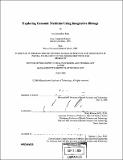Exploring genomic medicine using integrative biology
Author(s)
Butte, Atul J
DownloadFull printable version (11.80Mb)
Other Contributors
Harvard University--MIT Division of Health Sciences and Technology.
Advisor
Isaac Kohane.
Terms of use
Metadata
Show full item recordAbstract
Instead of focusing on the cell, or the genotype, or on any single measurement modality, using integrative biology allows us to think holistically and horizontally. A disease like diabetes can lead to myocardial infarction, nephropathy, and neuropathy; to study diabetes in genomic medicine would require reasoning from a disease to all its various complications to the genome and back. I am studying the process of intersecting nearly-comprehensive data sets in molecular biology, across three representative modalities (microarrays, RNAi and quantitative trait loci) out of the more than 30 available today. This is difficult because the semantics and context of each experiment performed becomes more important, necessitating a detailed knowledge about the biological domain. I addressed this problem by using all public microarray data from NIH, unifying 50 million expression measurements with standard gene identifiers and representing the experimental context of each using the Unified Medical Language System, a vocabulary of over 1 million concepts. I created an automated system to join data sets related by experimental context. (cont.) I evaluated this system by finding genes significantly involved in multiple experiments directly and indirectly related to diabetes and adipogenesis and found genes known to be involved in these diseases and processes. As a model first step into integrative biology, I then took known quantitative trait loci in the rat involved in glucose metabolism and build an expert system to explain possible biological mechanisms for these genetic data using the modeled genomic data. The system I have created can link diseases from the ICD-9 billing code level down to the genetic, genomic, and molecular level. In a sense, this is the first automated system built to study the new field of genomic medicine.
Description
Thesis (Ph. D.)--Harvard-MIT Division of Health Sciences and Technology, 2004. Includes bibliographical references (p. 215-227).
Date issued
2004Department
Harvard University--MIT Division of Health Sciences and TechnologyPublisher
Massachusetts Institute of Technology
Keywords
Harvard University--MIT Division of Health Sciences and Technology.